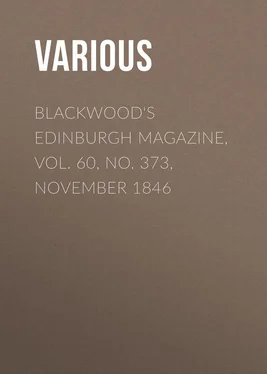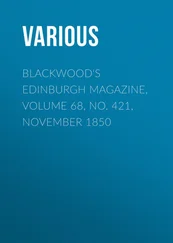Various - Blackwood's Edinburgh Magazine, Vol. 60, No. 373, November 1846
Здесь есть возможность читать онлайн «Various - Blackwood's Edinburgh Magazine, Vol. 60, No. 373, November 1846» — ознакомительный отрывок электронной книги совершенно бесплатно, а после прочтения отрывка купить полную версию. В некоторых случаях можно слушать аудио, скачать через торрент в формате fb2 и присутствует краткое содержание. Издательство: Иностранный паблик, Жанр: periodic, foreign_edu, Путешествия и география, на английском языке. Описание произведения, (предисловие) а так же отзывы посетителей доступны на портале библиотеки ЛибКат.
- Название:Blackwood's Edinburgh Magazine, Vol. 60, No. 373, November 1846
- Автор:
- Издательство:Иностранный паблик
- Жанр:
- Год:неизвестен
- ISBN:нет данных
- Рейтинг книги:5 / 5. Голосов: 1
-
Избранное:Добавить в избранное
- Отзывы:
-
Ваша оценка:
- 100
- 1
- 2
- 3
- 4
- 5
Blackwood's Edinburgh Magazine, Vol. 60, No. 373, November 1846: краткое содержание, описание и аннотация
Предлагаем к чтению аннотацию, описание, краткое содержание или предисловие (зависит от того, что написал сам автор книги «Blackwood's Edinburgh Magazine, Vol. 60, No. 373, November 1846»). Если вы не нашли необходимую информацию о книге — напишите в комментариях, мы постараемся отыскать её.
Blackwood's Edinburgh Magazine, Vol. 60, No. 373, November 1846 — читать онлайн ознакомительный отрывок
Ниже представлен текст книги, разбитый по страницам. Система сохранения места последней прочитанной страницы, позволяет с удобством читать онлайн бесплатно книгу «Blackwood's Edinburgh Magazine, Vol. 60, No. 373, November 1846», без необходимости каждый раз заново искать на чём Вы остановились. Поставьте закладку, и сможете в любой момент перейти на страницу, на которой закончили чтение.
Интервал:
Закладка:
War being resolved on, Marlborough and Eugene met at Tournay on the 28th April, and commenced the campaign by the capture of the fort of Mortagne, which capitulated on the same day. Their force already amounted to sixty thousand men, and, as the troops were daily coming up from their cantonments, it was expected soon to amount to double the number. The plan of operations was soon settled between these two great men; no difference of opinion ever occurred between them, no jealousy ever marred their co-operations. They determined to commence serious operations by attacking Douay – a strong fortress, and one of the last of the first order which, in that quarter, guarded the French territory. To succeed in this, however, it was necessary to pass the French lines, which were of great strength, and were guarded by Marshal Montesquieu at the head of forty battalions and twenty squadrons. Douay itself also was strongly protected both by art and nature. On the one side lay the Haine and the Scarpe; in the centre was the canal of Douay; on the other hand were the lines of La Bassie, which had been strengthened with additional works since the close of the campaign. Marlborough was very sanguine of success, as the French force was not yet collected, and he was considerably superior in number; and he wrote to Godolphin on the same night – "The orders are given for marching this night, so that I hope my next will give you an account of our being in Artois." 6 6 Marlborough to Godolphin, 20th April, iv. 182.
The Duke operated at once by both wings. On the one wing he detached the Prince of Wirtemberg, with fifteen thousand men, by Pont-a-Tessin to Pont-a-Vendin, where the French lines met the Dyle and the canal of Douay; while Prince Eugene moved forward Count Fels, with a considerable corps, towards Pont Auby on the same canal. The whole army followed in two columns, the right commanded by Eugene, and the left by Marlborough. The English general secured the passage at Pont-a-Vendin without resistance; and Eugene, though baffled at Pont Auby, succeeded in passing the canal at Sant and Courieres without serious loss. The first defences were thus forced; and that night the two wings, having formed a junction, lay on their arms in the plain of Lens, while Montesquieu precipitately retired behind the Scarpe, in the neighbourhood of Vitry. Next morning the troops, overjoyed at their success, continued their advance. Marlborough sent forward General Cadogan, at the head of the English troops, to Pont-a-Rache, to circumscribe the garrison of Douay, on the canal of Marchiennes on the north; while Eugene, encamping on the other side of the Scarpe, completed the investment on the west. The perfect success of this enterprise without any loss was matter of equal surprise and joy to the Duke, who wrote to the Duchess in the highest strain of satisfaction at his bloodless triumph. It was entirely owing to the suddenness and secresy of his movements, which took the enemy completely unawares; for, had the enterprise been delayed four days longer, its issue would have been extremely doubtful, and thousands of men must, at all events, have been sacrificed. 7 7 "In my last, I had but just time to tell you we had passed the lines. I hope this happy beginning will produce such success this campaign as must put an end to the war. I bless God for putting it into their heads not to defend their lines; for at Pont-a-Vendin, when I passed, the Marshal D'Artagnan was with twenty thousand men, which, if he had staid, must have rendered the event very doubtful. But, God be praised, we are come without the loss of any men. The excuse the French make is, that we came four days before they expected us." — Marlborough to the Duchess , 21st April 1710. Coxe, ix. 184.
Douay, which was immediately invested after this success, is a fortress of considerable strength, in the second line which covers the French province of Artois. Less populous than Lille, it embraces a wider circuit within its ample walls. Its principal defence consists in the marshes, which, on the side of Tournay, where attack might be expected, render it extremely difficult of access, especially in the rainy season. Access to it is defended by Fort Scarpe, a powerful outwork, capable of standing a separate siege. The garrison consisted of eight thousand men, under the command of the Marquis Albergotti, an officer of the highest talent and bravery; and under him were the renowned Valory, to direct the engineers, and the not less celebrated Chevalier de Jaucourt, to command the artillery. From a fortress of such strength so defended, the most resolute resistance might be expected, and no efforts were spared on the part of the Allied generals to overcome it.
The investment was completed on the 24th, and the trenches opened on the 5th May. On the 7th, the head of the sap was advanced to within two hundred and fifty yards of the exterior palisades; but the besiegers that night experienced a severe check from a vigorous sally of the besieged with twelve hundred men, by which two English regiments were nearly cut to pieces. But, on the 9th, a great train of artillery, consisting of two hundred pieces, with a large supply of artillery, arrived from Tournay; on the 11th, the advanced works were strongly armed, and the batteries were pushed up to the covered way, and thundered across the ditch against the rampart. The imminent danger of this important stronghold now seriously alarmed the French court; and Marshal Villars, who commanded their great army on the Flemish frontier, received the most positive orders to advance to its relief. By great exertions, he had now collected one hundred and fifty-three battalions and two hundred and sixty-two squadrons, which were pompously announced as mustering one hundred and fifty thousand combatants, and certainly amounted to more than eighty thousand. The Allied force was almost exactly equal; it consisted of one hundred and fifty-five battalions and two hundred and sixty-one squadrons. Villars broke up from the vicinity of Cambray on the 21st May, and advanced in great strength towards Douay. Marlborough and Eugene immediately made the most vigorous preparations to receive him. Thirty battalions only were left to prosecute the siege; twelve squadrons were placed in observation at Pont-a-Rache; and the whole remainder of the army, about seventy thousand strong, concentrated in a strong position, covering the siege, on which all the resources of art, so far as the short time would admit, had been lavished. Every thing was prepared for a mighty struggle. The whole guns were mounted on batteries four hundred paces from each other; the infantry was drawn up in a single line along the intrenchment, and filled up the whole interval between the artillery; the cavalry were arranged in two lines, seven hundred paces in rear of the foot-soldiers. It seemed another Malplaquet, in which the relative position of the two armies was reversed, and the French were to storm the intrenched position of the Allies. Every man in both armies fully expected a decisive battle; and Marlborough, who was heartily tired of the war, wrote to the Duchess, that he hoped for a victory, which should at once end the war, and restore him to private life. 8 8 "I hope God will so bless our efforts, that if the Queen should not be so happy as to have a prospect of peace before the opening of the next session of parliament, she and all her subjects may be convinced we do our best here in the army to put a speedy and good period to this bloody war." Marlborough to the Duchess , May 12, 1710. "I hear of so many disagreeable things, that make it very reasonable, both for myself and you, to take no steps but what may lead to a quiet life. This being the case, am I not to be pitied that am every day in danger of exposing my life for the good of those who are seeking my ruin? God's will be done. If I can be so blessed as to end this campaign with success, things must very much alter to persuade me to come again at the head of the army." Marlborough to the Duchess , 19th May 1710. Coxe, iv. 191, 192.
Интервал:
Закладка:
Похожие книги на «Blackwood's Edinburgh Magazine, Vol. 60, No. 373, November 1846»
Представляем Вашему вниманию похожие книги на «Blackwood's Edinburgh Magazine, Vol. 60, No. 373, November 1846» списком для выбора. Мы отобрали схожую по названию и смыслу литературу в надежде предоставить читателям больше вариантов отыскать новые, интересные, ещё непрочитанные произведения.
Обсуждение, отзывы о книге «Blackwood's Edinburgh Magazine, Vol. 60, No. 373, November 1846» и просто собственные мнения читателей. Оставьте ваши комментарии, напишите, что Вы думаете о произведении, его смысле или главных героях. Укажите что конкретно понравилось, а что нет, и почему Вы так считаете.












